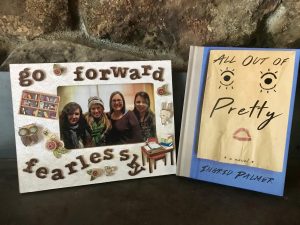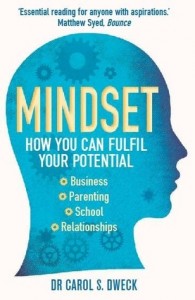Posts by Kristan Hoffman
I think there’s a common vision of the writer as a loner. Supposedly we all sit alone in our small dim rooms, hunched over the blue glow of our laptops, muttering to ourselves as we try to work out the perfect sequence of words. (I may or may not be doing that right now, haha.) Or even in a crowded coffee shop, we toil in a different sort of solitude, headphones on, coffees going cold, immersed in our own imaginary worlds, oblivious to the real one tizzying on around us.
And of course, there’s some truth to those images. But I also think — I hope — that we here at Writer Unboxed know the other truth. The truth of community.
When I graduated college, I lost the built-in community of my creative writing program. No more professors to mentor me, no more classmates to exchange work with. For a while, I tried to get by on my own, relying on reading to instruct me, and author events to inspire. But it quickly became apparent to me that I needed something more. I needed to be in a group of my peers, people who would see and understand me, who knew my dreams because they dreamed them too.
I considered an MFA (and still sometimes do) but the timing and cost weren’t in my favor, so I joined a small group of local writers instead. Most were hobbyists, and that was fine. But then, over time, the group ballooned into something large and unwieldy. So I approached the people with whom I felt the strongest connection and asked if they wanted to break off. I thank my lucky stars every day that they said yes.
For almost 10 years now, Sarah Wedgbrow, Stephanie Mooney, and Ingrid Palmer have been my critique partners. Somewhere along the way, they also became some of my closest friends. When we all lived in the same city, we would meet every week at Barnes & Noble and mark up printed pages with comments and questions. Now we use Google Hangouts to span 3 time zones and 4,600 miles, emailing each other files to read and discuss.
I can say without a doubt that I would not be the writer (or the person) I am today without these women. We each bring our own strengths to the group, and then we use those strengths to build each other up. Sarah is a master of character, with impeccable story instincts. Stephanie’s imagination never fails to dazzle and delight me. Ingrid could rewrite the phone book into poetry.
Critique partners have a tough job. They have to balance feedback with cheerleading. They have to maintain their own voices and perspective while also helping you to best express yours. They work for free, somehow making time for your pages despite their own busy lives, and their own hungry manuscripts. Of course you’re doing the same for them — and that’s what makes this such a special bond. All of the blood, tears, sweat, and heart are shared.
Read MoreDear Young Writer,
(“Young” meaning where you are in your writing journey, by the way. Not your actual age.)
I may be older and wiser, or I may just be waxing nostalgic, but either way, I’d like to say a few things to you, if you don’t mind indulging me.
First, you are innocent and hopeful, and that makes me smile. You only have the vaguest notion of how books are made, but you know without a shadow of a doubt that you want to be part of making them. You have big dreams and ambitions, and you’re eager to reach them. You’re ready to “starve” for your art, for your career.
But are you ready to work?
Because, my cherished friend, making books takes a lot of hard work. Even if we focus just on the writing part, it’s so much harder than you think. Right now, your writing process is basically just playing make-believe on paper. That’s not a bad thing! You imagine people and places, you watch them in your mind, and then you jot down their stories in a flurry of words. Your only purpose is your own excitement. It’s so pure and self-fulfilling.
But someday it may not feel like enough, I’m sorry to say. More than likely, you will begin to ask each new story, “Why am I writing this? What will it achieve? Will other people like it? Will anyone pay me for it?” Those questions cannot drive a story forward, but they can drive a writer to madness.
It’s so tricky, this business of being creative. On the one hand, you have to be a dreamer, someone who lets their imagination roam, and who enjoys trying to capture those boundless flights of fancy within the limits of language. On the other hand, you have to work within an established system, finding your path through the rules and rigors of publishing, and accepting that not all stories will sail successfully out of the safe harbor of your heart.
To be clear, this is not an either-or situation, and it’s not a battle. It’s more of a spectrum, or a dance. I think most writers exist in constant motion between the artistic and commercial spaces. We try to negotiate the right balance for each story, and for ourselves. We try to forgive that balance for constantly shifting beneath our feet.
Part of me thinks that I shouldn’t mention any of this to you, dear friend, because I don’t want to scare you off. I believe in the value of what you’re doing. Stories shape our world. Please never forget that.
But the other part of me feels compelled to share these truths with you, because I want you to be emotionally prepared for what’s coming. I don’t want you to expect your writing career to go quickly or smoothly, because it probably will not, and if/when it doesn’t, I don’t want that to cripple you.
If you do find yourself starting to lose some of the joy — that spark in your soul that ignites when you’re following a story — try to remember this:
Read MoreIt’s almost midnight, and I’m sitting in the dark with my laptop, music on and earbuds in, my husband falling asleep in bed next to me. This is what so much of my writing life has looked like over the past decade. I imagine this is what much of it will look like in the decades to come, too.
But of course, there have been changes over the years. Big ones. For example, my husband wasn’t always my husband, and we didn’t always live in this house, and hey, when did this baby monitor become a permanent fixture on my night stand? (Answer: about nine months ago.)
Sometimes it feels like I’ve always been looking for a better way. Looking ahead to a time where writing will rule the day, instead of sneaking in with the moonlight. I remember when I was a teenager, imagining how great it would be when I got to college and could specialize in writing, instead of having to spend so much time on homework for other subjects. And then in college, dreaming of graduation and life as a “real” adult, when I could work a mindless job just to pay the bills so I could focus on my novels. And then at work, wishing there were some way to quit my job and write full-time.
And then do you know what happened? I did quit my job to write full-time, and I still dreamed of a day when I would write more. More more more. Faster. Better. Quicker. Smarter. More.
To be honest, I don’t know if that desire will ever go away. But I try not to let it take over. Because if I pursue Faster Better Quicker Smarter More More More, I will never be able to rest. There is always more More.
Instead, I try to keep hold of something I discovered about two or three years into writing full-time: I can live the writing life that I want, right now. It doesn’t have to exist only in a faraway future. In fact, in some ways I’ve been living that writing life all along.
Read MoreMaybe it’s because I’m the daughter of two architects, but I’ve always thought of writing a book as being like building a house. You pour the foundation, frame the walls, install the roof, rough-in the plumbing and electric… etc. etc. If you’re a plotter, you’ll do all this work based on blueprints you drew up ahead of time. If you’re a pantser, you’ll just rent a cement truck, buy some lumber and bricks, and hope for the best.
But the reality is, most of us will never build a house from scratch. So maybe a more relatable starting point for the analogy is moving in and decorating.
Read MoreThe first sign was music. Or lack thereof. My mind was calling for silence. Demanding it, to the point that I couldn’t even bear to turn on the radio while driving. And not just because I was tired of hearing the same 10 songs over and over. (Even the good ones get old after awhile.) Something inside me needed to rest.
The quiet went on for days. Weeks. Months. No music. Few books. Hardly any writing. It feels scary, almost shameful, to admit that last part. I’ve spent so much of my life wanting to be a writer, carving out space and time to be a writer, justifying the cost and heartache of being a writer. How could I not be writing?
Only recently, when I finally found myself yearning for music again, did I realize what I’d been doing, and how very vital it was to my work.
Read MoreSince I was about 9 years old, all I’ve wanted is to be a writer. Some of my strongest memories are of sitting in my own little room at my parents’ print shop, surrounded by filing cabinets and spare computer parts and dusty paper samples, filling the hours between school and dinner by scribbling stories into notebooks. Back then, the words seemed to flow so easily, like water, like magic. Now? Not so much.
To be honest, most days I have to trick myself into writing. No joke. I think my Internal Editor is to blame. I don’t know when exactly she came into my life, or how she got to be such a powerful voice in my head, but she is the definition of a frenemy. She claims to be on my side, says she’s only trying to help me be better. And maybe sometimes that’s true. But mostly she slows me down, makes me doubt myself, and urges me to strive for perfection — which doesn’t exist and thus can never be reached.
What a jerk.
So when I say that I trick myself into writing, I guess what I’m really doing is tricking my Internal Editor. Getting her to go away for a while, or at least quiet down.
Here are some of the techniques I turn to:
Read MorePhoto by IQRemix
There’s a carnival game I love called Roller Bowler. The objective is to propel a bowling ball over a hump on a metal track. Sounds simple, but it’s not so easy. Too little force, and you won’t make it over the hump in the first place. Too much force, and the ball will go racing over the hump, rebound against the rear wall, and come hurtling right back at you. Either way, you lose.
Daily writing sessions are like Roller Bowler for me. If I don’t bully myself a little bit, I can easily waste the day running errands, surfing the internet, or even cleaning the house. But if I push myself too hard, I can end up sucking all the joy out of my follow-your-passion pursuit. For me personally, that kind of negative energy creates an even bigger obstacle than regular old distractability.
But if I apply just the right amount of pressure, that’s when the magic is unlocked. Like a Roller Bowler ball settling into the valley of its track, I find myself comfortably in the zone. The minutes pass by without my even noticing. My fingers fly, and my words fill the page with tension, imagery, and snappy dialogue. I’ve won the game.
Again, sounds simple, but it’s not so easy. How do you find that balance between too much force and not enough?
Read MoreA few months ago, my husband recommended that I read the book MINDSET. At first I dismissed it as just another one of the many business/management guides that clutters his nightstand from time to time. But my husband insisted that this book was different, that it would be good for me. In fairness, he has been known to be right on one or two occasions, so I decided to give it a chance.
He was right.
MINDSET explains a lot of things about myself — especially about my attitude toward writing and achievement — that I had sensed but never fully articulated. Furthermore, the book offers productive alternatives for some of my biggest hangups. It’s not really a how-to or self-help book, but in examining the benefits and the power of a growth mindset, it does end up guiding readers toward a better path.
Here’s the crux of it, from the back cover:
“World-renowned Stanford University psychologist Carol Dweck explains why it’s not just our abilities and talent that bring us success — but whether we approach our goals with a fixed or growth mindset.”
What is fixed mindset?
The belief that we are who we are. Period. Static. Maybe you can change a little bit here and there, but for the most part, you’re born with whatever skills, intelligence, creativity, personality, etc. you’re ever going to get.
What is growth mindset?
The belief that we can always improve — and that the process of improving is as important as the improvement itself.
Why does your mindset matter?
As Dweck shows through various case studies, the fixed mindset sets people up for failure, generally speaking. I mean, if you happen to be a super genius with natural talent and charm, then OK you’re all set! But for the other 99.99% of us, it’s not so easy. And if we’re convinced that we’re either smart or not, either artistic or not, either (fill in the blank) or not, then when we fail at something, that’s it. We’re done. No point in trying again.
But if we instead believe that every failure is just a step on the path to success? A necessary step? A valuable step, because what doesn’t work teaches us about what will work? Then we’re already where we want to be. The journey is as much the destination as the destination itself.
There is a lot more nuance to fixed vs. growth mindset than that — and really, it’s a spectrum, not just one or the other — but many of the problems that Dweck identifies as part of the fixed mindset remind me of issues that writers face.
Read MorePhoto by Cristiano Gatti
Today is Super Bowl Sunday. For some of you, that might mean painting your face and screaming at the TV. For others, it might mean eagerly watching the commercials for a change. And for still others of you, it might not mean anything at all.
Personally I am a huge football fan, and in honor of the big game, I want to spotlight a few NFL players and the lessons that I’ve learned from them — lessons that apply to writing.
JJ Watt, defensive end for the Houston Texans
If you’re not familiar with JJ Watt, then it’s safe to assume you’re not a football fan. At just 25 years of age, JJ is a force to be reckoned with on the field — sacking quarterbacks, intercepting passes, and even coming in on offense to catch a touchdown or two. He does it all, and he does it better than anyone this game has ever seen. That’s why he recently secured a 6-year, $100 million contract, and just last night was named Defensive Player of the Year for the second time. (He is actually the first player in history to be unanimously selected for this award.)
Genetically blessed, with a comfortable upbringing, and now fame and fortune — JJ Watt is the kind of guy that should be easy to hate. But no one hates JJ, not even the guys that he slams into the turf every Sunday. Why? Because he is passionate, humble, and hard-working beyond belief. Off the field, he is known for his kindness and generosity, as well as his sense of humor. He is a source of inspiration, not jealousy.
Once upon a time, he was just a kid with a dream, like anyone else. So how did he get here? Through tireless effort and relentless focus. Since high school, he has been renown for putting in more hours in the weight room than anyone else, for working on his days off, and for approaching every play like it’s the game-winning snap of a Super Bowl.
Imagine how far you could go as a writer if you had that kind of attitude.
Fred Jackson, running back for the Buffalo Bills
Not everyone is going to have such a charmed path, no matter how hard they work. Take Fred Jackson, for example. His path to the NFL has been full of zigzags and setbacks.
Read MoreAccording to one of my favorite children’s books, if you give a mouse a cookie, he’s going to want a glass of milk to go with it. And if you give the mouse a glass of milk, he’s going to want a straw (to drink with). Then a mirror (to avoid a milk mustache). Then scissors (to groom himself in the mirror). So on and so forth. There is always something more to want.
I think the writing life can be that way too. If you write a good short story, then you’ll want to try a novel. Once you write a novel, you’ll probably want an agent. If you get an agent, you’re going to hope for a book deal. Then good reviews, bestseller lists, prestigious awards, bigger advances…
Rising expectations are a double-edged sword. It’s good to have goals, and to push oneself to grow. But it’s destructive to never be appreciative of where you currently are and what you’ve achieved.
I often struggle to walk that line in a graceful, healthy way. In fact, I often fail. But lately there are two things – two pretty basic things – that are helping me to keep a better balance.
1. Morning Pages
Made famous by Julia Cameron’s THE ARTIST’S WAY, morning pages are supposed to be handwritten and stream-of-conscious. A way to get in touch with one’s inner self, as well as to clear the pipes for creativity to flow. I basically do them all wrong – I type them on the computer, sometimes in the morning but usually just in spurts throughout the day – and yet I still find that they work.
They help me the way that scales help a pianist.
Read MorePhoto by Angie Liang
I really hate to be all me-me-me, but I got married last weekend, and let’s be honest: that’s all I can think about right now. It is a big, wonderful change.
It was also a bit of an ordeal. Like most ordeals, it taught me many things. These lessons aren’t necessarily specific to writing, but let’s be honest: if you’re a writer, everything reminds you of writing.
So here are a few important lessons that I learned, and how they can be applied to the work that we do:
1. Understand your vision, and stay true to it.
Years ago, my boyfriend (now husband!) and I decided that we were going to do our wedding differently. A small ceremony, with just parents and siblings, followed by receptions in each of our hometowns for the rest of our family and friends. The idea was to keep the exchange of vows intimate, but also to ensure that we could spend real, quality time with every single person who wanted to celebrate with us. That was our vision. Unfortunately, not everyone understood or appreciated it, and in the months leading up to our wedding, we faced some heartbreaking opposition. Only by reaffirming our vision time and again — both to ourselves and to those who preferred a more traditional wedding — did we manage to stay strong against doubt and frustration, succeed in our goals, and ultimately prove the naysayers wrong.
Similarly, in writing, you will encounter many people who insist, “This is how you should write a book.” “All novels of that genre must include X, Y, and Z.” “If you try something new, readers won’t understand and/or won’t like it.”
It’s okay to listen to those voices and consider what they’re saying — but it’s also okay to respectfully disagree. Writing, like a wedding, is not one-size-fits-all. Follow your heart. Trust your instincts. Be true to yourself.
Read MoreThanks to Stephanie Perkins and Paula McLain, I can visit Paris anytime I want. Shilpi Somaya Gowda has taken me to Mumbai. My tour guide in Maine is Elizabeth Strout. And I hiked the Pacific Crest Trail with Cheryl Strayed.
Good books take us on a journey, both literally and figuratively. As a writer, I’ve started to think more carefully about the literal part. Because when it’s done well, setting impacts pretty much every facet of a story — plot, voice, character, theme, etc.
This is where “write what you know” can be useful. Presumably if you’ve spent enough time in a place, you can cull details from your experiences and imbue a story with them. Specificity is what brings pages to life.
But what if you want to write about someplace you’re not familiar with? Writers aren’t often jetsetters; we can’t just hop over to a foreign locale and take notes. So what’s the best way to create a rich and authentic setting?
Research.
Fortunately we live in a day and age with many excellent resources at our fingertips. Here’s what I generally recommend:
Read MorePhoto by Shauna Younge Dessert Tables.
Halloween has always been one of my favorite holidays. The laughter, the screams, the decorations, the ghost stories — it’s all such fun. But even from a young age, I knew that “trick-OR-treating” was a misleading term, because you can’t have one without the other. No costume? No candy.
Unfortunately this is true of writing too. The good and bad go hand-in-hand.
But what if we look at it another way? The good and bad go hand-in-hand. That means whenever one of those pesky writerly “tricks” comes up, we can flip it around and find a wonderful writerly “treat” too. For example…
TRICK – Doubt
So much of writing involves just 3 people: Me, Myself, and I. Writers toil for hours in solitude, every sentence like a private conversation with ourselves. In that kind of a closed loop, it’s easy for confidence to flag and questions to seep in through the cracks. Why am I doing this? What are the odds that I will succeed? Hasn’t someone already written this? Am I even any good?
TREAT – Affirmation
When we do let other people into our writing — whether through blogging, publishing a story, or just talking to a friend — that support and encouragement is one of the warmest feelings in the world. In times when doubt threatens to pull me into a dark place, I call upon my reserves of reassurance to get me through: friendly blog comments, fan emails, complimentary rejections from literary magazines, the unconditional love and faith of my family.
Read More
Confession: I kind of hate when people talk about muses, “the zone,” or anything else that makes writing sound like magic. As if what we do is so easy, so inexplicable, so wondrous.
Confession #2: I hate it because I almost never feel that way myself. I don’t have a muse; GPS doesn’t recognize “the zone” as a destination; and my words definitely do not materialize from thin air like fairy dust. Every day is a grind. I have to sit at my desk, place my fingers on the keys, and force myself to try and give shape to the thoughts and stories in my head. Usually they come out quite muddy on the first go-round, so I read the lines over and over and over, tweaking here, deleting there, until they get close, and closer, and finally close enough.
I’ve been writing this way for years, but only recently did I realize: Oh hey, that actually IS magic.
See, what most people forget — or maybe don’t even know — is that magic is really, really hard work. I mean, Houdini didn’t just wake up one day and say, “Quick, lock me in a box! Don’t worry, I’ll escape.” And David Copperfield can’t actually levitate.
As a kid, I took some magic classes, and I still remember learning my first trick. It was a cups-and-balls routine that required quick hands, confident presentation, and perfect timing. Not easy for an 8-year-old to master. First, the teacher showed us the trick. Then, he explained how it was done and helped us go through the motions. Lastly, he made us practice.
Read More- « Previous
- 1
- 2
- 3
- Next »
















